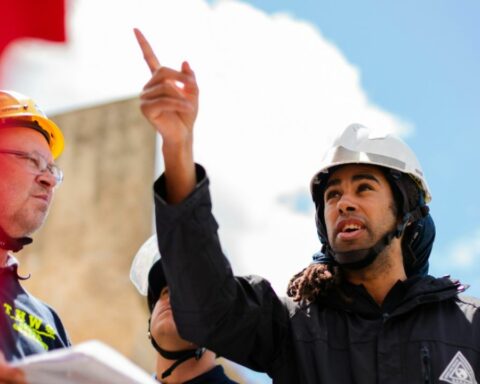Five weeks before the plebiscite to end the constituent process, the campaign for the Approval continues to coordinate, in the midst of a territorial deployment that has already begun and in view of the television slot, which will begin on August 5. In this context, the three groups that make up Approve, including the official blocs (Apruebo Dignidad and Socialismo Democrático) and the command of social organizations (Aprobe x Chile), develop a coordination that they have defined as “unitary”, despite who registered separately in the Electoral Service (Servel). Proof of this is that, as of this Monday, they began to occupy a common headquarters, which will be the campaign’s operations center and which is located in offices provided by the Equality Institute (owned by the PS).
In the midst of constant meetings with representatives of political parties and movements, which have taken place in various headquarters of the groups that make up the command, the campaign for the Approval is taking shape, for which the names that will make up its secretariat have already been defined. executive, which will be made up of two representatives from Approve Dignidad, two from Democratic Socialism and one from Approve x Chile. Those who were finally chosen for said coordination are Lautaro Carmona (PC), Ximena Peralta (CS), Nicole Cardoch (PS), José Toro (PPD) and Ezio Costa (Aproba x Chile, on behalf of the environmental NGO FIMA).
Among the visible faces of the coordination of the campaign, is that of Ximena Peralta Fierro, a lawyer from the University of Chile and a former candidate for regional councilor (Core) representing the communes of Providencia, Ñuñoa, La Reina, Las Condes, Vitacura and Lo Barnechea, and with work experience in human rights justice with a feminist perspective, in the Humanas Corporation. Militant of Social Convergence (CS) -the party of President Gabriel Boric-, is close to the President and in recent weeks has emerged as one of the influential voices in the internal conversations behind the construction of the design of the communication story and the deployment territory that will support the Approval, in view of the plebiscite on September 4.
-What is your diagnosis on this phase of coordination between the coalitions of Government and Approve x Chile -which represents social organizations- and what have been the main difficulties in that relationship between both worlds?
-There is a table of political parties and movements that works every Wednesday, and all of us who participate in that table are assisted by the conviction that it is necessary to articulate the greatest social and political force in the face of the plebiscite, because no coalition by itself is enough for the amplitude we need. And we don’t only understand it in terms of political breadth, but of social massiveness, where the parties alone are not enough either. So, within this framework, the parties and movements made the decision to participate in a common command platform called Approve x Chile, which these days is putting together its teams and shaping its way of working, and which is based on this idea that the meeting between parties and social organizations, in all its breadth, is what we need to win the plebiscite.
In general, for the Broad Front and Approve Dignity, this kind of encounter between social mobilization and politics is not something we are so familiar with, because most of the parties, especially the Broad Front, are founded on social movements, in the idea that these social movements also have political tools –properly such– to dispute the institutionality and the changes in those spaces. And, of course, there is always the difficulty that social organizations can have all the prominence they deserve, which is our conviction and the reason why we decided to get involved in the Approve x Chile command, because, otherwise, we would have signed up as a party and do our conventional political campaign. But the truth is that we are assisted by this conviction that it is necessary to achieve the greatest possible political and social breadth.
-Beyond the territorial aspect, which is fundamental, what is going to be the axis of the campaign, in discursive and communicational terms? What will be the foundations of the Approval story in the coming weeks?
-I believe that the Approval campaign, in some way, is just beginning, as a proper campaign and, in that sense, we need to go find those people who have doubts, because they are uninformed, because they do not know or because they have the legitimate question of how this proposal will affect your daily life. For us, the emphasis should be there: on being able to explain how the new Constitution is a key tool to continue advancing in the changes, and to establish a path of change, and our vision is that the new Constitution offers guarantees in that sense. , which contains rules that generate new principles for society and for the State, rights, democratic institutions, care for the environment, among other issues.
In addition, it generates the certainty of a change path and, on the contrary, the Rejection option does not generate any certainty in that sense and, what is more, those who uphold it are those who have held back changes for a long time. So, our emphasis is on continuing a path of change through Approval and telling the truth, in the sense that, if Rejection wins, we will wake up on September 5 and the current Constitution is the one of 1980, which was won through of a fraud and was reformed in cosmetic terms, and that, above all, it has a vision of society and of the State that no longer corresponds to these times and proof of this is that the right is trying to disguise itself, saying that they too They seek a new constitution.
-How do you observe the deployment of the Rejection campaign? What do you think of the discourse of the right around committing to a new Constitution, in an idea that is subscribed by some actors linked to the center-left or former Concertación?
-We have seen how the right and the conservative sectors and retarders of changes, decided to subcontract the campaign for the Rejection, both in social organizations that are dubious in their constitution and that, rather, are organizations that in their majority seem to be created and financed by the conservative right. We have also observed how they have grabbed some figures from the former Concertación who unfortunately fell into the Rejection game. In that sense, everyone can carry out the campaign as they want, but we know that we must be clear that, in general, those who put up the money, put up the music, and the right, are orchestrating a campaign that others unfold, but that is their usual campaign, and it is the campaign of those who have delayed the changes and who were also for the Refusal of entry, of those who a few days ago, at the Convention, voted against or abstained from the idea of decreeing Chile as a social state of law. They are the same ones that now make commitment documents, where, according to them, they are now for the changes, so it is very difficult to believe in their consistency. For the same reason, we believe that behind that mantle of some social organizations that are inclined towards Rejection, in reality, is the right wing, which cannot be any guarantee of change.
-Approve to improve or reform, how do you think that vision of Democratic Socialism –of an Approval with surnames– affects the unitary campaign that they are carrying out? How do you observe the coexistence between both coalitions within the command?
– Indeed, in the Government there are two coalitions of parties. Each one has its internal diversity as well, and I believe that in these months we have worked very well in the unity of purpose, because these two coalitions are united by seeking the success of our government program, and also the success of the new Constitution, which by the way is much more than a program, and it is about an immense purpose and a historical task. We have been generating communication channels, much better than the ones we had before, because nobody is going to hide under the rug that we come from different places, but today we do have much more in common, in terms of unity of purpose, than those nuances we have. We do not see as a danger that there is diversity around the Approval, understanding that there is a great family that, beyond its differences, puts the Approval and the new Constitution as the protagonist.
At the strip level, we seek to have very good communication. Technically, each party is entitled to a certain amount of minutes, depending on the votes it gets, where we as Social Convergence decided that all our minutes were going to go to a common pool, in the idea of having a citizen campaign, which would put these great issues, beyond a partisan identity. That is our decision, to which the Broad Front and I Approve Dignity withdrew, and as for the Democratic Socialism parties, I understand that it is a conversation that they still have pending, which is being polished.
-How to manage those nuances and differences around the proposal for a new Constitution, within the command for the Approval? Do you consider this speech to improve certain elements of the constitutional proposal feasible?
-The great family of Approval, in its diversity, is united in approving, which is what is important, because on the ballot there are only two options and the entire great family is going to vote for Approval. That there are nuances and diversity is evident, but it is something that I play down, in the sense that I do not think there is anyone who is a fan of the text of the new Constitution. I like it, it seems to me an excellent text, which generates many advances and proposals that put us at the forefront of development in economic matters, in matters of social rights, in matters of caring for the environment, of protecting people, and so on. But I don’t think there is no one who is a fan of the text in its entirety, with each of its letters and its subsections. And if the text has to continue to be improved, by the way, it has to continue to be improved, in the face of which we cannot deny that possibility. I play down the notion that there are two aspects to the Approval, where I also think it is clear that the text can continue to be improved and, in fact, there is a very important part of what is being raised today as problems with the new Constitution, which These are issues that the same constitutional text mandates to resolve in legislative matters.
-One of the biggest criticisms raised since the Rejection points to the constituent process and its forms, how do you intend to deal with that vision, and how do you project the debate will be in the coming weeks, prior to the exit plebiscite?
-One of the most prevalent disinformation that appears in a recent study by the Telar Platform is regarding the personal aspects of the constituents and regarding the work of the Convention. I believe that the plebiscite is not about an evaluation of how much we liked or disliked the constituent process, with its people, with its institutions and its controversies. The exit plebiscite is about whether this new Constitution is an adequate proposal to look the future in the eye, which is the fundamental question and which will be the focus of our campaign: to say why this is a good answer, that proposes advances for Chile, and why it is the path of change that citizens are looking for. Now, there is no doubt that there are people doing business around the bad reputation of the Convention, and I call for us to stop that discussion, because I believe that what interests citizens is to have true information and to be able to listen to a debate about how this new text allows us to move forward, and how Rejection, in my opinion, means only stagnation, setbacks and no guarantee of improvement in people’s lives.








